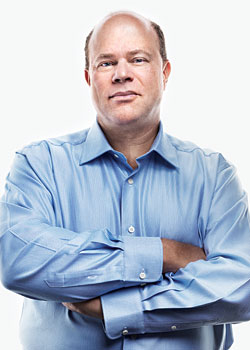 |
(Photo: Marco Grob) |
With the stock markets down, Europeans rioting in the streets, and worried investors all but stuffing cash inside their mattresses, it was unsurprising that the mood at the annual Ira Sohn conference at the Time Warner Center in May, at which Wall Street’s moneymen of the moment share their investment outlooks to benefit a pediatric cancer fund, was about as cheerful as the annual Prophecy Conference in Tulsa.
“The rebound has been synthetic, fabricated by governments that can’t afford it,” droned one presenter, whose speech was accompanied by a PowerPoint image of New York City sliding over a waterfall. He then warned the audience members, who were mostly wearing dark suits and funereal expressions, to expect the course ahead to be “wrenching and unpredictable.”
At least the premillennialists have Jesus. In midtown in the spring of 2010, all anyone in the hedge-fund world seemed to believe in was gold.
Then, late in the afternoon, David Tepper, a hedge-fund manager out of New Jersey, bounded up onstage and ripped off his tie, as though the lack of air in the room had become physically constraining. “I got a little story for you,” he said into the microphone, and proceeded to read it from a crumpled piece of paper in his hand.
“In 1898, the first international urban-planning conference convened in New York,” he said. “It was abandoned after three days because none of the delegates could see any solution to the growing crisis caused by urban horses and their output. In the Times of London, one reporter estimated that in 50 years, every street in London would be buried under nine feet of manure.”
He paused, allowing people in the crowd to snicker to themselves, then went on to recommend a handful of investments most would consider highly risky, among them debt in AIG and equity in financial companies like Bank of America and even some banks in teetering Europe. “I know, everyone hates the financials,” he said. “But the PIIGS”—Portugal, Ireland, Italy, Greece, and Spain, considered to be the most troubled European economies—“every single one has a deficit-reduction plan! The ECB—the Bundesbank—bought back government bonds!” He paused for dramatic effect. “Holy Christ. It’s like the chastity belt is off, and the girl is starting to play.”
The crowd tittered nervously. “On the way to work this morning, I got a headache because I was listening to one guy talking about how there’s gonna be hyperinflation. And then after him there was some guy telling me there’s going to be a depression and deflation. Neither—neither—is most likely going to happen,” he said. “The point is, markets adapt, people adapt. Don’t listen to all the crap out there.”
Tepper had good reason to feel confident in this thesis. Last year, when the market effectively crapped itself, Tepper’s firm, Appaloosa Management, made a fortune rolling around in it. In February and March 2009, when consensus had coalesced among market watchers that certain financial institutions were insolvent and would have to be nationalized, triggering a massive sell-off that drove shares of companies like Citigroup and Bank of America into the single digits, Tepper decided to tune out the chatter. After all, the Treasury Department had said it would hold up the banks—why wouldn’t they keep their promise? He directed deputies at his firm to purchase billions of dollars’ worth of bonds and stocks in those and other financial institutions. Then they waited.
At the time, taking such a position was like swimming into the ocean as a tsunami approaches: It looked crazy. But actually it was the right thing to do. When the government intervened as promised, the value of the shares shot back up. Appaloosa made over $7.5 billion. Not bad for a tiny fund from New Jersey.
“It was like that scene in Trading Places with the orange-juice futures,” Tepper recalled early this summer, over lunch at the Hilton Hotel near his office, which is located in a nondescript red building across from the mall in Short Hills. “The whole market and the whole world were in pure panic,” he said, chuckling. “Everyone was too scared to do anything.”
The trade shot Tepper to the top of the list of hedge-fund-industry earners annually compiled by AR Magazine, just ahead of famed investor George Soros, and earned him comparisons to Warren Buffett in the financial press and a certain amount of hero worship inside the industry. “He is a golden god,” one distressed-debt investor told me, admitting that he had the Wall Street Journal article describing the trade taped to his wall. “Can you give him my résumé?”
In addition to an increase in profile, the trade netted him a personal payday of nearly $4 billion, more money than Tepper, who grew up in Pittsburgh and had never even been on a plane until he was 21, literally knows what to do with. “What do you think I should do with it?” he asked me. “I could buy an island. I could buy a private jet—but I have NetJets. I could get myself a 22-year-old!

